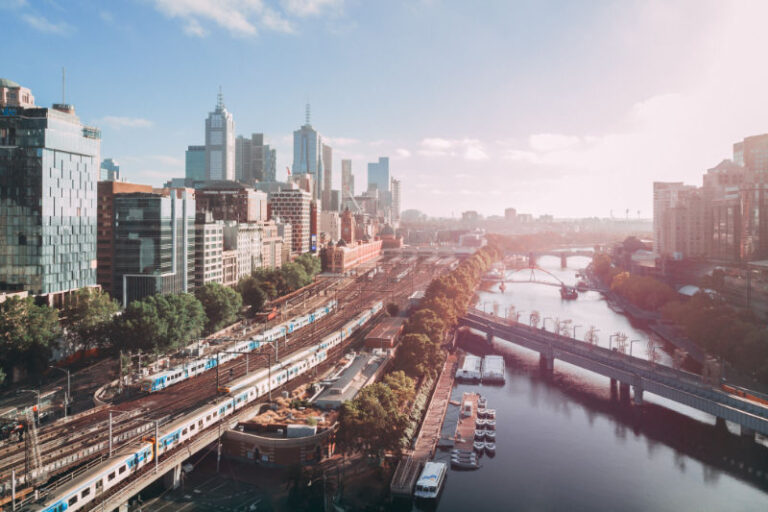How to buy a house in Melbourne can feel overwhelming, especially when median prices range from $600,000 in outer suburbs to over $2 million in prestigious areas.
Melbourne has a lot to offer, but you need to make sure the property is the right price, location, value, size, and fit for your lifestyle.
Whether you’re a first home buyer or upgrading, navigating Melbourne’s unique property market requires more than just financial readiness. Properties are usually sold through real estate agents in Melbourne.
This guide breaks down everything you need to know—from understanding suburb price variations and securing the right home loan to mastering auction strategies and managing extra costs.
With expert insights and practical tips, you’ll be equipped to confidently find and secure your ideal home in Melbourne’s competitive landscape.
Read on to discover how to make your property dreams a reality.
Key Takeaways
- Research Melbourne’s diverse suburbs thoroughly, as median house prices range from $600,000 to over $2 million, depending on location
- Get pre-approval for your home loan before house hunting to understand your budget clearly
- Factor in additional costs beyond the purchase price, including stamp duty, conveyancing fees, and building inspections
- Consider both auction and private sale properties, with auctions requiring immediate deposit payment
- First home buyers in Victoria may be eligible for stamp duty concessions on properties under $750,000
- Always consider building and pest inspections before finalising any property purchase
- Allow a minimum of 6-8 weeks for settlement after your offer is accepted, unless you are a cash buyer
Table of Contents
- Understanding Melbourne’s Property Market
- Determining Your Budget and Getting Finance Ready
- First Home Buyer Grants and Concessions in Victoria
- Finding Properties in Melbourne
- Property Inspection and Due Diligence
- Understanding Sales Methods in Melbourne
- Legal and Professional Support
- Settlement and Moving In
- Additional Costs and Ongoing Expenses
- Summary
- FAQs
Understanding Melbourne’s Property Market

Melbourne’s property scene is incredibly diverse, with each suburb offering its own unique vibe, amenities, and price points that can really influence your investment choice. Before you dive into your property search, it’s important to get a good grasp of these market dynamics.
Check out median house prices using Domain and CoreLogic data
You’ll notice big price differences across Victoria. Inner suburbs like Toorak, South Yarra, and Brighton come with a premium price tag, often over $2 million, thanks to their prestige, closeness to the CBD, and top-notch amenities.
These areas also boast excellent public transportation and numerous cultural attractions, but be prepared for higher costs.
Compare recent sale prices to catch market trends
If you’re looking for something more affordable, outer suburbs like Thomastown, Roxburgh Park, Melton, and Craigieburn might be right up your alley.
Properties in this area typically range from $600,000 to $800,000. These neighbourhoods are growing rapidly, with new infrastructure and increasing populations, making them ideal for first-time home buyers or investors seeking long-term growth.
Use realestate.com.au and domain.com.au to keep tabs on sales
Keeping an eye on auction clearance rates, recent sales, and weekly market updates through these sites provides you with valuable information to time your purchase just right.
That said, interpreting all this data can be challenging, so having local market expertise can make a significant difference in navigating Melbourne’s unique property landscape.
Determining Your Budget and Getting Finance Ready
Establishing a realistic budget extends far beyond calculating your borrowing capacity—it requires understanding the full spectrum of costs involved in Melbourne property purchases and ensuring your financial situation can accommodate both upfront expenses and ongoing commitments.
Your financial commitments, such as mortgage repayments and council rates, should be updated in your budget after the purchase.
Calculate your borrowing capacity based on current income and expenses
Most lenders assess your financial situation based on your income, existing debts, living expenses, and employment stability.
However, securing pre-approval from multiple lenders allows you to compare interest rates, loan features, and borrowing terms to find the most suitable mortgage for your circumstances.
A mortgage broker can streamline this process by presenting your application to multiple lenders simultaneously, potentially securing better rates and terms than you would by approaching lenders individually.
Mortgage brokers also understand lender preferences and can match your financial profile with institutions most likely to approve your application.
Aim to save at least a 20% deposit to avoid Lenders Mortgage Insurance (LMI)
The standard house deposit in Melbourne is typically 20% of the purchase price, which helps avoid mortgage insurance costs.
For a property priced at $800,000, this means saving $160,000—a substantial amount that requires careful planning and potentially years of dedicated saving.
However, some lenders accept deposits as low as 5-10% with the additional cost of LMI.
While this reduces the upfront savings requirement, LMI can add thousands to your total loan cost, making it essential to weigh the benefits of entering the market sooner against the long-term financial impact.
Factor in stamp duty costs – approximately $25,000-$55,000 for properties between $600,000-$1 million
Stamp duty represents the most significant single upfront government cost in Victorian property transactions.
Stamp duty is a one-time property transfer tax that typically needs to be paid within 30 days of settlement.
For a $600,000 property, stamp duty is approximately $25,000, rising to $55,000 for a $1 million purchase.
The Victorian Government provides online calculators for precise estimates based on your specific circumstances.
Include conveyancing fees ($1,200-$2,500), building inspections ($400-$800), and moving costs
Additional costs include conveyancing fees, which range from $1,200 to $2,500, depending on the transaction’s complexity.
Building inspection and pest inspection fees typically cost between $400 and $800 each, while moving expenses can range from $1,000 to $5,000, depending on the distance and volume of belongings.
Get pre-approval from multiple lenders to compare interest rates and loan features
Having a pre-approved loan demonstrates to vendors that you’re a serious potential buyer with confirmed financing.
This is particularly important in Melbourne’s competitive auction environment, where vendors prefer dealing with buyers who can proceed to unconditional purchase immediately.
I often recommend clients obtain pre-approval from multiple sources before beginning their property search, as this provides flexibility and negotiating power when making offers on suitable properties.
First Home Buyer Grants and Concessions in Victoria

The Victorian Government offers several targeted supports designed to help first-home buyers enter Melbourne’s property market, although eligibility requirements and application processes can be complex.
Victoria’s State Revenue Office provides a comprehensive list of concessions and grants for first-home buyers.
Apply for stamp duty concessions on properties valued under $750,000 through the State Revenue Office Victoria
First home buyers purchasing properties valued under $600,000 are completely exempt from stamp duty, while those purchasing homes valued between $600,001 and $750,000 receive tapered concessions.
These savings can amount to tens of thousands of dollars, making previously unaffordable properties accessible to eligible buyers.
Access the First Home Owner Grant of $10,000 for new homes under $750,000
The First Home Owner Grant provides $10,000 for eligible buyers purchasing new homes valued up to $750,000. This grant applies to newly constructed homes, off-the-plan purchases, and substantially renovated properties that meet specific criteria.
First Home Owner’s Grant is available for eligible Australian permanent residents and citizens buying their first home in Australia.
Consider the HomeBuilder Grant if building or buying off-the-plan (subject to eligibility and timing)
Previous HomeBuilder grants may still be relevant for some contracts signed within eligible timeframes, although current policy settings are subject to regular change. It’s essential to verify current eligibility requirements and application deadlines before making purchase decisions.
Check with your lender about shared equity schemes available in Victoria
Some financial institutions offer shared equity products that reduce the upfront deposit requirement by co-investing in the property.
These schemes can help eligible buyers enter the market sooner, though they typically involve sharing future capital gains with the lending partner.
Finding Properties in Melbourne

The property search process in Melbourne requires a multi-faceted approach that goes beyond online browsing to include networking with local real estate agents, attending inspections, and potentially accessing off-market opportunities through professional connections.
Search major real estate websites, including realestate.com.au, domain.com.au, and large agency website listings
Online property portals offer comprehensive listings with detailed descriptions, high-quality photos, and accurate price guides.
However, these platforms only show publicly marketed properties, representing a portion of the available opportunities in Melbourne’s market.
Register with local real estate agents in your target suburbs for early property notifications
Establishing relationships with estate agents in your preferred areas provides access to properties before they’re widely advertised. Many agents maintain databases of registered buyers and contact them about suitable properties before launching public marketing campaigns.
Attend open inspections on weekends to get familiar with different property types and prices
Weekend open inspections offer invaluable opportunities to assess properties firsthand, understand local market conditions, and observe buyer behaviour.
It is also an opportunity to discuss first-hand with the agent as to whether they have any listings coming up that may be a better match to your criteria. Attending multiple inspections in your target suburbs helps calibrate your expectations regarding property conditions, pricing, and competition levels.
Consider using a buyer’s advocate if you’re time-poor or unfamiliar with Melbourne’s market
Working with a buyer’s advocate in Melbourne gives you access to exclusive off-market properties that aren’t listed on public websites.
These opportunities often come with less competition and can offer better value since vendors save on costly marketing and lengthy sales processes.
Thanks to our extensive network of industry contacts including real estate agents, developers, and other property professionals, we can provide clients with early access to suitable properties before they hit the broader market.
This insider advantage is especially valuable in Melbourne’s competitive property scene, where desirable homes often attract multiple offers within days of being listed.
Monitor upcoming auctions through realestate.com.au to track market activity
Understanding auction activity in your target areas provides insights into market trends, buyer behaviour, and realistic pricing expectations. Even if you’re not planning to bid at a few auctions, observing the process helps prepare for potential future participation.
Property Inspection and Due Diligence

Thorough due diligence protects buyers from costly surprises and ensures informed decision-making. Melbourne’s diverse housing stock, ranging from heritage homes to modern developments, requires careful assessment by qualified professionals.
Conduct building inspections with qualified professionals certified by the Housing Industry Association
A comprehensive building inspection examines structural integrity, safety systems, and potential maintenance issues.
For Melbourne’s older housing stock, particular attention should be paid to foundational stability, electrical systems, and weather-related wear and tear. Professional inspectors certified by industry associations provide detailed inspection reports highlighting immediate concerns and potential future issues.
Arrange pest inspections, particularly important for older Melbourne homes and those near parks
Pest inspectors examine properties for termite activity, wood rot, and other pest-related damage that could compromise structural integrity or require expensive treatment.
Melbourne’s climate and proximity to parks or bushland can increase pest risks, making professional inspection essential for protecting your investment.
Review the Section 32 Vendor’s Statement for important property information and restrictions
The Section 32 Vendor’s Statement contains crucial legal and planning information, including title details, easements, planning restrictions, and any outstanding notices from local councils.
Vendors must provide this document before signing the contract and require careful review with your legal representative.
Check council planning permits and zoning through your local council website
Verifying planning permits ensures that all previous renovations and extensions were completed with proper approvals.
Unauthorised work can create legal complications and expensive rectification requirements. Council records also reveal any pending planning applications for neighbouring properties that might affect your enjoyment of the property.
Verify property boundaries and easements through the land title documents
Understanding exact property boundaries prevents future disputes with neighbours and ensures any planned improvements comply with setback requirements. Easements for utilities, drainage, or access may restrict certain uses of the property and should be clearly understood before purchase.
Understanding Sale Methods in Melbourne

Melbourne’s property market is renowned for its auction culture, though private sales also offer distinct advantages depending on your circumstances and risk tolerance. Most homes in Melbourne are sold by private sale or auction.
Understanding both methods is crucial for successful property acquisition.
Prepare for auction bidding by attending practice auctions and setting a maximum bid limit
Auctions create a fast-paced, emotionally charged environment where decisions must be made immediately. At an auction, properties often sell for higher than the advertised range provided by the real estate agent.
Attending a few auctions as an observer helps familiarise yourself with the process, auctioneer techniques, and competitive dynamics before participating as a bidder.
Setting a firm maximum bid limit before auction day prevents emotional overspending during the heat of competition.
This limit should be based on your pre-approval amount, comparable sales data, and an independent property valuation, rather than auction-day emotions.
Understand that auction properties require a 10% deposit payment on the day if successful
Successful auction bidders must sign the contract of sale and pay a 10% deposit immediately (unless alternative arrangements have been agreed with the agent prior to the auction), with no cooling-off period. This unconditional commitment requires that all financial, legal advice, and due diligence be completed before auction day.
Consider private treaty sales which typically include a 3-day cooling-off period
Private sales offer more negotiation flexibility, including terms such as settlement period, special conditions, and price. The standard 3-day cooling-off period enables buyers to conduct final due diligence and arrange settlement logistics without the immediate pressure of auction-day commitments.
Negotiate sale conditions such as building inspection approval in private treaty contracts
Private treaty contracts can include conditions such as satisfactory building inspection, finance approval, or pest inspection clearance. These conditions provide protection during the contract period, though they may make your offer less attractive to vendors compared to unconditional offers.
Have your solicitor review all contracts before signing any legal documents
All property contracts, whether auction or private treaty, require legal review to ensure favourable terms and identify potential issues. A written offer to buy a house is not legally binding until both you and the vendor have signed a Contract of Sale or Contract Note.
Our auction expertise and negotiation skills often secure favourable outcomes for clients in both sale methods.
Our experience reading market conditions, understanding vendor motivations, and timing offers strategically can mean the difference between success and disappointment in Melbourne’s competitive environment.
Legal and Professional Support
Professional legal representation is not only advisable but legally required in Victoria for property transfers. Selecting experienced professionals familiar with Melbourne’s property market ensures smooth transactions and protects your interests.
Engage a conveyancer or solicitor before making any offers to review contracts
Your legal representative should be engaged early in the process to review contracts, explain legal obligations, and advise on potential risks. This early engagement is particularly important for auction properties, where contract review must be completed before auction day.
Find qualified professionals through the Law Institute of Victoria website
The Law Institute of Victoria maintains directories of qualified legal practitioners specialising in property law. Choosing professionals with specific property experience and local market knowledge ensures competent representation throughout the transaction.
Ensure your legal representative can attend settlement within the required timeframe
Settlement typically occurs 30-90 days after the contract exchange, although this timeframe can be negotiated based on the needs of both parties. Your solicitor or conveyancer will finalise the settlement with your lender and the seller.
Discuss all contract terms including settlement period, deposit amount, and special conditions
Understanding all contractual obligations helps prevent disputes and ensures a smooth completion. Your legal representative should explain the implications of different terms and advise on any unusual or unfavourable conditions.
Get advice on strata or owners corporation fees if buying an apartment or townhouse
Apartment and townhouse purchases typically involve ongoing body corporate or strata fees, which range from $3,000 to $8,000 annually. These fees cover building maintenance, insurance, and shared facility upkeep, representing significant ongoing costs that should be factored into your budget.
Settlement and Moving In

The settlement period involves finalising all legal and financial arrangements for property transfer. Proper preparation ensures smooth completion and timely access to your new home.
For a detailed overview of typical timeframes and what to expect during each stage, see our guide on how long it takes to buy a home.
Arrange home and contents insurance before settlement date as required by most lenders
Most lenders require home and contents insurance to be in place before settlement, protecting their security interest in the property. Insurance premiums typically range from $800 to $2,000 annually, depending on property value, location, and coverage levels.
Organise utility connections for electricity, gas, water, and internet through your chosen providers
Utility connections should be arranged several weeks in advance of settlement to ensure services are available upon moving in. This includes electricity, gas, water, and NBN or other internet services, each of which requires separate arrangements with different providers.
Complete final inspection within the last 14 days before settlement to check condition
The final inspection verifies that the property remains in the same condition as when you signed the contract, with all included fixtures and fittings present. Any discrepancies should be reported immediately to your legal representative for resolution before settlement completion.
Ensure your deposit funds are available for settlement through your conveyancer’s trust account
Settlement requires the balance of the purchase price to be available through your conveyancer’s trust account. This typically involves your lender releasing funds directly to your legal representative, though cash buyers must arrange payment through their own accounts.
Receive property keys and title documents on settlement completion
Upon successful settlement completion, you receive property keys and legal title, marking the official transfer of ownership. This exciting time marks the culmination of your property search and the beginning of your homeownership journey in Melbourne.
Additional Costs and Ongoing Expenses
Property ownership involves ongoing financial commitments beyond mortgage repayments. Understanding these ongoing costs ensures accurate budgeting and prevents financial stress after purchase.
Budget for ongoing costs including council rates (approximately $1,500-$3,000 annually)
Council rates fund local government services and vary by property value and location. These quarterly payments typically range from $1,500 to $3,000 annually and increase periodically based on council budget requirements and property valuations.
Factor in home insurance premiums ranging from $800-$2,000 per year depending on coverage
Home and contents insurance protects against fire, theft, storm damage, and other risks. Premium costs vary based on property value, location, coverage levels, and chosen excess amounts. Most Melburnians take out insurance cover for their homes and belongings.
Consider maintenance and renovation costs for older Melbourne properties
Melbourne’s heritage housing stock often requires ongoing maintenance and periodic renovation to preserve value and livability. Budgeting for regular maintenance, heating and cooling updates, and eventual major renovations ensures your property remains comfortable and valuable.
The best apartments in Melbourne tend to be those built in the 1950s, 1960s, and 1970s but be aware of upcoming maintenance costs.
Account for strata fees if buying an apartment, typically $2,000-$8,000 annually
Apartment ownership involves quarterly strata fees that cover building insurance, maintenance, cleaning, and the upkeep of shared facilities. These fees vary significantly based on accommodation, building size, age, amenities, and management efficiency, representing a substantial ongoing cost.
Plan for mortgage repayments and potential interest rate increases in your budget
Interest rates fluctuate over time, affecting your mortgage repayments and overall affordability. Conservative budgeting should account for potential interest rate rises, ensuring you can maintain repayments even if rates increase from current levels.
Summary
This comprehensive guide on how to buy a house in Melbourne covers key steps for first home buyers, including researching suburbs, securing pre-approval for home loans, understanding auction versus private sales, and factoring in extra costs like stamp duty and inspections.
It highlights the importance of due diligence, legal support, and financial planning to navigate Melbourne’s competitive market confidently.
For personalised advice and expert assistance in finding your ideal property, book a consultation call with a trusted buyers agent today to make your home buying journey smooth and successful.
FAQs
How much deposit do I need to buy a house in Melbourne?
Typically, 20% of the purchase price to avoid LMI, though some lenders accept 5-10% with additional mortgage insurance costs. For a $800,000 property, you’d need $160,000 to avoid LMI or as little as $40,000-$80,000 with LMI.
What is the average time from offer to settlement in Melbourne?
Typically, 30-60 days for established properties, although this settlement period can be negotiated based on the needs of both parties. New construction may require longer timeframes, depending on the completion schedule.
Do I need a solicitor or conveyancer when buying in Melbourne?
Yes, professional legal representation is required by law in Victoria for property transfers. Choose experienced practitioners familiar with Melbourne’s property market and regulatory requirements.
Can temporary residents buy property in Melbourne?
Temporary residents must notify the Foreign Investment Review Board and can typically only buy one established dwelling to live in. Foreign buyers face additional restrictions and surcharges compared to Australian citizens and permanent residents.
What suburbs offer the best value for first home buyers in Melbourne?
Consider outer suburbs like Cranbourne, Werribee, Sunbury, and Wallan for more affordable entry points into Melbourne’s market. These areas offer good value while maintaining access to public transport and employment centres.






